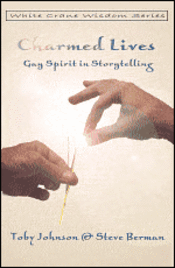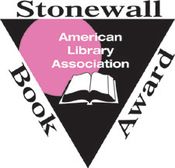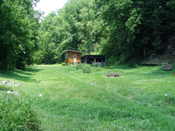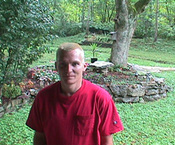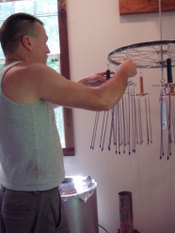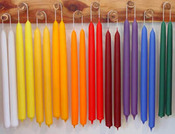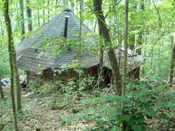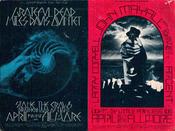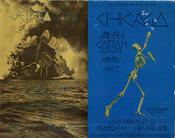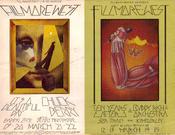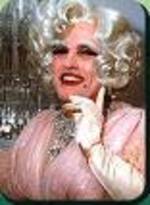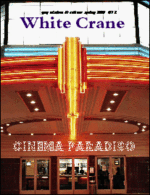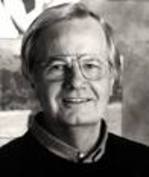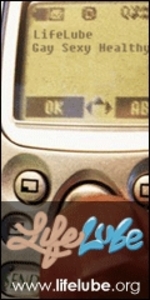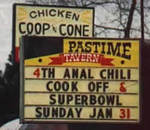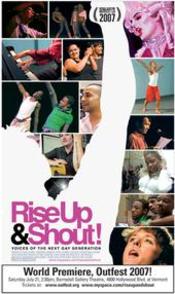 Last November, the Gay Men’s Medicine Circle of Los Angeles, under the guidance of a committee headed by Don Kilhefner, Malcolm Boyd and Mark Thompson produced a talent showcase entitled Rise Up & Shout!: Voices of the Next Gay Generation. The evening showcased a new generation of Gay and Lesbian artists, but more importantly it created an opportunity for an older Gay generation to interact in a supportive manner with a younger Gay generation, which, in addition to actually being able to learn from their elders, were probably introduced to the idea of “community elders.” A win-win situation for one and all.
Last November, the Gay Men’s Medicine Circle of Los Angeles, under the guidance of a committee headed by Don Kilhefner, Malcolm Boyd and Mark Thompson produced a talent showcase entitled Rise Up & Shout!: Voices of the Next Gay Generation. The evening showcased a new generation of Gay and Lesbian artists, but more importantly it created an opportunity for an older Gay generation to interact in a supportive manner with a younger Gay generation, which, in addition to actually being able to learn from their elders, were probably introduced to the idea of “community elders.” A win-win situation for one and all.
The evening, at the Barnsdall Gallery Theater in Hollywood, was presented as a benefit for White Crane Institute and was filmed by Brian Gleason. The documentary film he made premieres this week. We had an opportunity to speak with Gleason about his involvement in Rise Up & Shout!:
WC: Can you describe the Rise Up & Shout! project and tell us what attracted you to it?
Brian Gleason: Rise Up and Shout! is a two part project for me. The first part was my involvement with the intergenerational committee that created the idea, planned and successfully executed the event, Rise Up and Shout!, which was an evening performance by and for Gay youth that took place on September 9, 2006. Not long after my involvement with the committee, I came up with the idea of a documentary film project centered around the event, and began directing that effort, which continues, and has its most recent culmination in the film world premiere at Outfest, on Saturday July 21, 2007.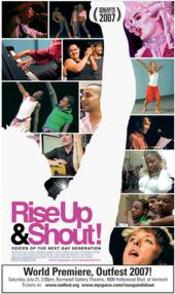
My interest in directing the documentary goes back to my move from San Francisco to Los Angeles in early 2004. I moved down to Los Angeles to work more closely with people like Don Kilhefner and Mark Thompson and Malcolm Boyd; three people who, to me, have really earned the title of elders in the Gay community. I started having phone conversations with Don and Mark a few years back, when I was still living in San Francisco, because I became so interested in their writings, where they spoke about the deeper roots of Gay history and culture and what it really meant to be Gay: that it was not just a sexual orientation but something much more, something that went back thousands of years in culture and art and history, surfacing in epics such as Gilgamesh, the writings of Plato, the work of Walt Whitman and others throughout the years.
Well, eventually I made the move to Los Angeles, and I have been working very closely with all three of these great men, and have formed very deep friendships with all of them. The idea initially came to me to interview them for some sort of book or video project, but then when we all started working on Rise Up And Shout!, it struck me that the most interesting aspect of this whole project was the intergenerational dialog that was occurring – that’s the theme, or the emotional "punch" that really hit me: finally I was experiencing Gay community: elders, adults and youth working together to help each other find their voice, to discover something valuable and lasting about themselves as Gay men. That became the focus and theme of the documentary, and I hope I’ve been able to adequately portray that in the film.
WC: Beautiful. It’s certainly a motivation White Crane understands. We’ve done a couple of issues addressing similar ideas, and worked closely with all the people you mention, too. I guess, in the interest of full disclosure for the readers, we ought to let readers know that White Crane Institute was a beneficiary of the event and I attended it. It was wonderful.
I suppose we all have ideas of what "intergenerational" dialog means. How difficult was it for you to assemble the cast you had? And what was the biggest surprise for you personally?
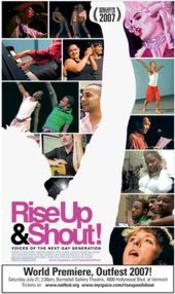 Brian: Assembling the cast literally took a year. We held something like three or four auditions, and most of the kids were quite talented, but it really became a matter of representing diversity of voice ‒ in other words, we didn’t want 15 opera singers, or 15 poets, etc. ‒ we needed a real mix to represent all the various voices in the Gay community. And we got it ‒ by the time we finished we had everything from glam opera to lesbian hip hop to classical poetry, film and everything in between – but this took everyone on the committee digging into all their email lists and their friends email lists and phoning and canvassing with audition posters. It was a hell of an effort, to put it mildly, but a fun and engaging one, and also one that harnessed every generation represented on the committee: some of the elders were able to find and audition the more classical acts: vocalists, etc., while some of the youth on the committee were able to find rappers, hip hop dancers and the like.
Brian: Assembling the cast literally took a year. We held something like three or four auditions, and most of the kids were quite talented, but it really became a matter of representing diversity of voice ‒ in other words, we didn’t want 15 opera singers, or 15 poets, etc. ‒ we needed a real mix to represent all the various voices in the Gay community. And we got it ‒ by the time we finished we had everything from glam opera to lesbian hip hop to classical poetry, film and everything in between – but this took everyone on the committee digging into all their email lists and their friends email lists and phoning and canvassing with audition posters. It was a hell of an effort, to put it mildly, but a fun and engaging one, and also one that harnessed every generation represented on the committee: some of the elders were able to find and audition the more classical acts: vocalists, etc., while some of the youth on the committee were able to find rappers, hip hop dancers and the like.
And there were a lot of surprises, most all of them working out really well. Jim Pentecost, a Broadway veteran, directed the show, and he knew all along that this was going to be a right-up-to-the-minute effort, and was able to keep us more or less calm throughout this whole process. I mean right up to a few weeks before the show, I think we had only sold like 8 tickets, and we wanted to fill a 300 seat house for the kids! But we did it. The biggest surprise for me personally was spending the afternoon interviewing Justin Miles, a 21 year old HIV positive poet, former drug addict and prostitute, who now lives with his Mormon parents in Simi Valley, has kicked the drug habit, and is pursuing a college degree. Justin opened right up to me, and was totally honest without being grandiose, and showed a wisdom way beyond his years. He talked straight up about the struggle with drugs, sex and love, coming out, trying to turn his life around and start anew ‒ all by the age of 21! He didn’t give me some sermon about the horrors of his past and how others should avoid this or that or do this or that, he simply talked openly about his situation, owned up to the choices he had made, talked honestly about his fears at the same time as his hopes for his future. It was really endearing and provocative, and if I’ve been able to capture just a little of that in the film then I’m happy.
WC: That’s a great story and pretty unusual for someone to be able to overcome the whole "poor me victimhood." What are some of the other stories that are in the film?
Brian: Well, another story, or I guess it’s more of a theme around which a few stories are wrapped, was the meetings, conversations and time spent together between some of the youth and elders. It’s funny, making a documentary, sometimes you capture moments that just happen and sometimes you "prime the pump" a little and see what happens.
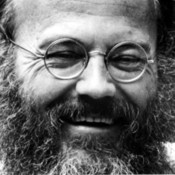 Well, sometimes the youth performers and the "elder" committee
Well, sometimes the youth performers and the "elder" committee  members from Rise Up just happened to run into each other, strike up a conversation, work together at rehearsals, etc. and sometimes I arbitrarily paired up the two groups. I did this with a couple of the performers but one in particular really struck me: I paired Steven Liang, an 18-year-old Chinese American Gay man who performed poetry readings with Mark Thompson, the producer of the Rise Up event and the former editor of the Advocate magazine. I had Mark give Steven a tour of his photojournalist career — Mark’s photos of people like Paul Monette and Robert Mapplethorpe and Ram Dass, Fellow Travelers, were hanging in a gallery in Silverlake, so I brought in Steven Liang and had Mark give him his own tour, when the gallery was closed. It was pretty incredible to watch Steven as he learned about these people — many of them he was not even aware of – and really got his first lesson in Gay culture and history. I realized how unavailable so much of our culture and history is to younger Gay people, and it became a real motivation for continuing to plow through all the difficulties and make the film.
members from Rise Up just happened to run into each other, strike up a conversation, work together at rehearsals, etc. and sometimes I arbitrarily paired up the two groups. I did this with a couple of the performers but one in particular really struck me: I paired Steven Liang, an 18-year-old Chinese American Gay man who performed poetry readings with Mark Thompson, the producer of the Rise Up event and the former editor of the Advocate magazine. I had Mark give Steven a tour of his photojournalist career — Mark’s photos of people like Paul Monette and Robert Mapplethorpe and Ram Dass, Fellow Travelers, were hanging in a gallery in Silverlake, so I brought in Steven Liang and had Mark give him his own tour, when the gallery was closed. It was pretty incredible to watch Steven as he learned about these people — many of them he was not even aware of – and really got his first lesson in Gay culture and history. I realized how unavailable so much of our culture and history is to younger Gay people, and it became a real motivation for continuing to plow through all the difficulties and make the film.
WC: Yes… we’re very familiar with Mark’s photos…White Crane is touring the exhibit around the country right now. It’s here in NY as we speak and it goes to Philadelphia and Washington D.C. next.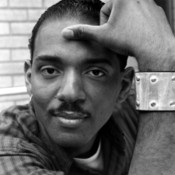
Brian: By the way, I use the terms youth and elders because I think, first of all, it evokes a good description of the intergenerational theme, but also because it’s the old tribal term, from back in the time when community was much more vital and youth and elders were always together, learning from each other and contributing back to the community. This is something that I think is really lost today, particularly for Gay people, since we come in this kind of Diaspora from towns all over the country into these cities where we don’t know each other, are separated in many ways from our families and original cultures, and have to quickly learn to adapt, get along and build a life, often very much alone.
WC: Who were your elders?
Brian: Well, as much as it sounds like a cliché, I’d have to say my Dad was my first elder. Of course it wasn’t always that way, growing up Gay and liberal in an Irish Catholic Republican family, but I’ll never forget one day when I was very young and tried to run away from home — Dad got very angry at first, but then I noticed him starting to cry, which he of course tried to cover up, and he ended up by saying "you’ll always have a place in my home, no matter what" and it turned out to be true over the years, and helped my coming out more than you can imagine. It’s ironic, as conservative as he was he taught me what acceptance really means.
WC: That’s actually very sweet, and I’m glad it was the first response you had. And who were your first Gay elders?
Brian: My first gay elders were Don Kilhefner, Mark Thompson and Malcolm Boyd. They were one of the big reasons I moved down to Los Angeles from San Francisco several years ago. When I was living up in SF, I called Don out of the blue one day, because I was having very strange dreams and I read an essay of his on dreams, so I Googled his name and found his number and to my surprise he picked up the phone and we talked for almost an hour. It was the first conversation I ever had where I really began to feel part of the larger Gay community — the cultural community that has fought for our rights over the years — and paved the way for an understanding that we are much much more than just a sexual orientation.
WC: Such as…?
Brian: We are, as Harry Hay put it, a separate people whose time has come, a people with a unique outlook on life and a significant contribution to make to world culture. Mark and Malcolm really welcomed me down here in Los Angeles, and without their support as friends and elders, this film would never have been made. The event, Rise Up and Shout, was essentially a year-long nose-to-the-grindstone effort that came out of a simple lunch between Mark and Don where it was decided to put on an event for gay youth. That’s grassroots community work, and people like Mark, Malcolm and Don have done it for decades now, and taught me that it’s our generation’s turn to take over and continue this vital work, to help gay people come together, build community and understanding, get over the homophobia and let the world know that we’ve come with a real gift to give the world — look at how many gay people are artists, healers, visionaries!
WC: In the Gay community, the problem seems to be one of opportunity with respect to that "Generation Conversation"…other than Rise Up & Shout! which was obviously a wonderful opportunity for everyone involved, I know Don Kilhefner has been making a lot of these situations happen. Have you worked with him on other projects?
Brian: Don and I have worked on several projects together, most notably the workshops for the group that he co-founded a few years back, the Gay Men’s Medicine Circle, a grass roots community organization here in Los Angeles that works with many gay men on issues such as HIV, crystal meth, and other psychological or spiritual aspects of their lives. The Circle has co-sponsored several major events, including Rise Up and Shout last year, and, a couple years back, the Standing On The Bones of our Ancestors conference, a weekend long seminar on the need for greater intergenerational dialog in the gay community. Don has been a professional mentor for me in my psychotherapy career, and has, more than anyone, taught me the importance of community, and what that word really means: that we gay men need to start assuming responsibility for each other.
WC: You’ve talked about Justin and Liang. Is there another favorite story in the movie you can talk about?
Brian: Sure ‒ it seemed like a little story at the time, and it kind of operated like a motif running just below the surface of the film, but when I started watching the footage I really noticed how Malcolm Boyd, 84-year-old priest and author and a member of the Rise Up committee, connected in a profound way with the performers and the other members of the committee. This event was really important for him, and it reminded me of something my Dad used to talk about: as he got older he really missed the opportunity to connect with the younger generations (outside his own children). I think everyone wants to give back in some way or another, but it reaches a kind of critical mass when you get older, and you really start to understand, and feel in a deep way, the connection between the generations and your role in that connection ‒ when that’s missing, as it really is in the modern world, I think it really affects the oldest generation (and also, in a profound way, the youngest generation) the most.
WC: Knowing Malcolm, that’s not hard to believe. His connection with this magazine has been a profound experience for us, too. Mark [Thompson], too. They’re both very passionate about the community of Gay men and their well-being.
So…the film premieres next week in Los Angeles [Rise Up And Shout!, will have its world premiere this summer at Outfest! Saturday, July 21, 2:30 at the Barnsdall Gallery Theatre 4800 Hollywood Blvd, Los Angeles, CA 90027 near Vermont] Is there anything that you wished you could have gotten that you missed? And, any final thoughts?
Brian: Well, I always feel like I missed something, I just think that’s part of the process. I love that Martha Graham quote, "No artist is satisfied. Ever." And I really feel it with this, my biggest artistic endeavor to date. It’s a strange, somewhat painful, somewhat wonderful feeling that keeps you going after that elusive "thing" in art, love, anything worthwhile.
As far as having missed anything specific, I’d say a couple things: I would have loved to have spent more time with the GLASS kids, but it was just impossible due to all the restrictions in the county youth foster system; and I would have loved to have followed all the kids more, found out what they are up to now, how they are doing after Rise Up and Shout, what impact it had on their lives – but I’m thinking maybe that will be the subject of my next documentary (he says, paying off credit card bills and trying to catch up on sleep)!
Final thoughts: let’s see, well, it’s been a real journey, and it is very true what people say who undertake projects like this: it almost kills you, and at the same time, it’s incredibly rewarding and makes you who you really are, and to me, that’s the whole point.
The Rise Up and Shout! event and film were put together by many hands in addition to Brian Gleason, including: Broadway director and producer Jim Pentecost, who directed the event Rise Up and Shout!, Don Kilhefner, Mark Thompson, Malcolm Boyd, Frank Rodriguez, Joey Shanley, Ethan Schvartzman, Virsil Mitchell, Elijah Cohen, Karen Minns, Kevin Yoshida, and all the members of the Gay Men’s Medicine Circle
